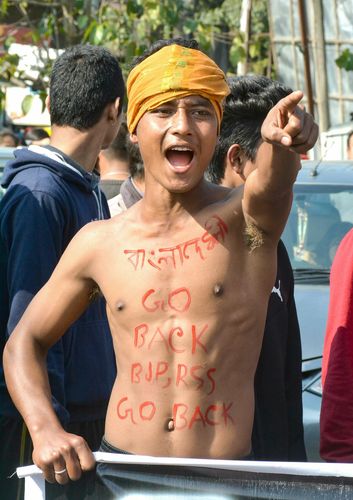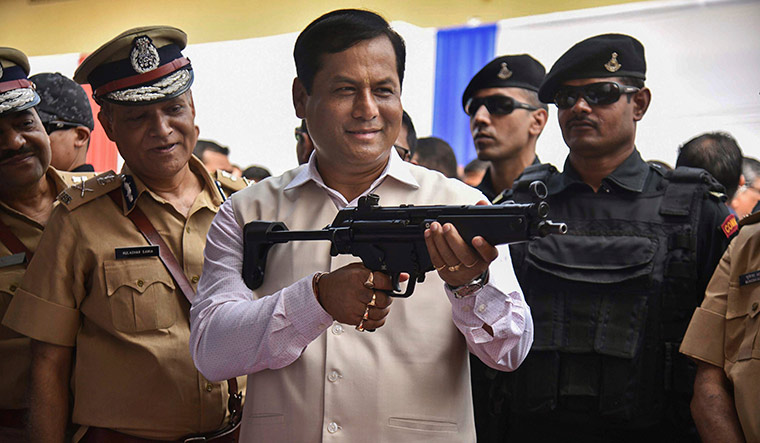Winds of change are blowing in the northeast. The Centre's contentious Citizenship (Amendment) Bill, 2016, has divided the region, with more and more people taking an anti-BJP stand. Some of the party's own lawmakers are up in arms against the bill, which would give citizenship to persecuted Hindus, Christians, Parsis, Sikhs, Buddhists and Jains from Bangladesh, Pakistan and Afghanistan. The northeast, particularly Assam, would have to bear the brunt of the influx.
At least six BJP MLAs in Assam, including speaker H.N. Goswami, slammed the Centre's decision to pass the bill in Parliament. The Lok Sabha passed it on January 8, and it will be tabled in the Rajya Sabha in the budget session.
The disgruntled MLAs went public with their protest, and will reportedly face disciplinary action soon. Their target was Chief Minister Sarbananda Sonowal, who was against illegal immigration as a firebrand member of the All Assam Students' Union. He joined the BJP and became chief minister on the same plank.
But now, more than two years later, he and the state BJP are in a dilemma. The National Register of Citizens draft, published last July, left out 40 lakh people in Assam, of which 20 lakh were Hindus, says the AASU. As the BJP (in Delhi) could not alienate its core base of Hindus, it had to tweak its stand on the illegal immigration issue.
The bill has split the Brahmaputra valley (mostly Assamese) and the Barak valley (mostly Bengalis). On January 8, moments after the Lok Sabha passed the bill, BJP spokesman Mehdi Alam Bora resigned. “An infiltrator cannot be divided into Hindu or Muslim,” he said. “The irony is that the people who fought the infiltrators are now in favour of [them].”
The state BJP has slapped show-cause notices on some MLAs, but no senior leader has openly addressed the dissent in the party. “It is a serious issue,” said a senior leader. “The party leadership will take a call. The MLAs have felt the pulse of the people and the disgruntlement in their constituencies. So, they have to respond to the call of the people. The central leadership should have understood that and should not have passed the bill in haste.”
Said BJP MLA and former Asom Gana Parishad leader Atul Bora: “What should I be afraid of? I am an MLA and I am within my rights to condemn the passing of this bill as my people do not like it. I will continue to do that.”
BJP state president Ranjit Das has been silent so far. He has sent a report to party president Amit Shah about the worsening situation of the party in Assam. Shah recently visited West Bengal, after recovering from swine flu, and would go to the northeast soon.
Interestingly, days before the bill was passed in the Lok Sabha, the Union government sought to allay fears of the indigenous Assamese. It set up a high-level committee to look into the implementation of clause six of the Assam Accord (1985), which seeks to protect and promote Assamese identity and culture. However, clause five of the same accord says foreigners will be detected and expelled. The citizenship bill, hence, goes against clause five of the accord.
Such was the backlash that the members of the high-level committee refused to attend a meeting convened by chairman and respected bureaucrat M.P. Bezbaruah. Helpless, he resigned.
Meanwhile, the protest against the bill has gathered steam in other northeast states, too. With the North East Students' Organisation, the umbrella organisation of students' organisations in the region, and more than 30 other bodies taking to the streets, there was violence in Assam after many years. Allegedly, some insurgent groups had backed the students' organisations.
The All Assam Students' Union, which supported the BJP's anti-immigrant agenda in 2016, has predicted a major reversal of the BJP's fortunes in the upcoming Lok Sabha elections. “I fail to understand why the chief minister, who came to power on the videshi hatao (remove foreigners) agenda, has forgotten his promise,” said AASU adviser Samujjal Bhattacharya. “If the bill is passed in the Rajya Sabha, it would spell doom for the BJP.”
Five lakh state government employees in Assam have threatened a hunger strike and even mass resignation. “More than jobs, land is important for us today,” said Tarun Borah, a member of an employees' association.
On January 17, Modi sent Ram Madhav, BJP general secretary and the party's northeast in-charge, to Assam to get a report on the public outrage.
In neighbouring Meghalaya, which has seen large-scale immigration from Bangladesh in the past three decades, the Conrad Sangma government passed a cabinet resolution against the bill. A.L. Hek, the sole BJP minister in the cabinet, agreed that the bill was “passed in haste”. Sangma and his Mizoram counterpart Zoramthanga met Rajnath Singh in Delhi on January 18.
Meghalaya BJP president Shibun Lyngdoh told THE WEEK that he was in a catch-22 situation. “On the one hand, I have to accept the direction of the central leadership,” he said. “On the other hand, I have to support the coalition partner in the state.”
The Indigenous People's Front of Tripura, the BJP's coalition partner in Tripura, has also begun protests. However, as the BJP has a simple majority on its own in the assembly, the IPFT pulling out of the coalition would not affect the BJP. Moreover, as refugees from Bangladesh form a majority in the state, political observers believe that the BJP could win the two Lok Sabha seats in the state.
Notably, some other states in the northeast, which will not be affected by the citizenship bill, have also become aggressive against the BJP. In Arunachal Pradesh, the political opposition to the bill gathered steam after Gegong Apang, the longest-serving chief minister of the state, resigned from the BJP on January 15. He said the BJP was not addressing the real issues in the state.
In Mizoram, a Christian-dominated state, politicians across parties have opposed it. Zoramthanga said he would meet Modi before taking any action. “As of now, the [passing of the] bill is a highly deplorable issue for us. We are rethinking our ties with the BJP,” he said. He is waiting for an appointment with the prime minister. State BJP president J.V. Hluna refused to comment.
Nagaland, the other Christian-dominated state, has asked the Modi government to review its plan to pass the bill, despite the fact that it grants citizenship to Christian refugees. Chief Minister Neiphiu Rio himself wrote to Modi about the decision. The state cabinet has some BJP members, who also voted against the bill.
Alemtemshi Jamir, working president of the Nationalist Democratic Progressive Party, which rules Nagaland, told THE WEEK: “I do not know why our government has done this. We enjoy [constitutional] rights and Nagaland is well secured from infiltration.”
It might seem surprising at first, but political observers say the entire non-BJP force in the northeast seems to be gearing up for a political change after the Lok Sabha elections. “So, whenever needed, it would be easy for them to [jump into another] boat. These northeast parties and politicians have understood that it might not be an all-BJP situation after a few months. This change in attitude came after the BJP's [recent] loss in four of five states,” said T.B. Roychowdhury, a professor of political science in Tripura.
The BJP, however, has its own plan. It will try to win the Bengali-dominated Silchar constituency in Assam, which is currently with the Congress, and Bodoland and other tribal areas, where the bill would have negligible impact. Notably, the state Congress in Assam has been silent on the bill.
Next, the BJP would go to the people in Christian-dominated states—Mizoram, Nagaland and Meghalaya—imploring them to support the bill, which gives citizenship to their persecuted Christian brethren, and which their state governments are opposing. This way, the BJP would try to win seats on its own, and reduce its dependency on allies. Outside the northeast, the BJP would launch a campaign slamming all non-BJP parties opposing the bill.
It would be interesting to see what the Congress does in the Rajya Sabha. It had walked out of the Lok Sabha instead of voting against the bill, for fear of being seen as anti-Hindu. The BJP, however, does not have majority in the upper house.
Interestingly, the Janata Dal (United), the BJP's ally, has also opposed the bill, and will vote against it in the Rajya Sabha. The party will even send a team to Assam, probably to support AASU and the Asom Gana Parishad.



